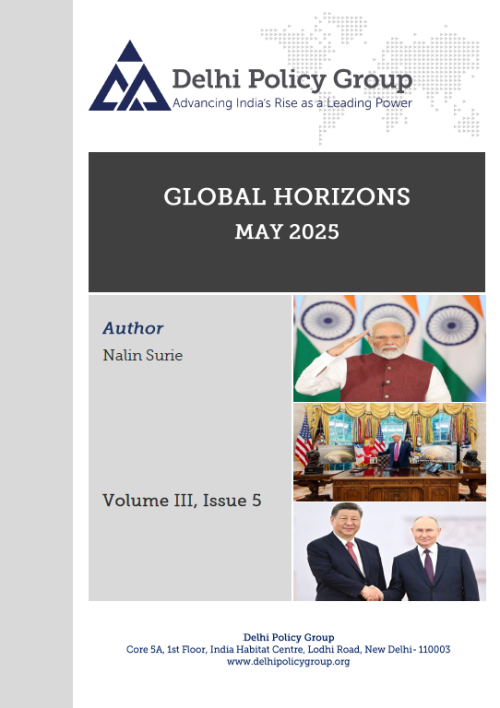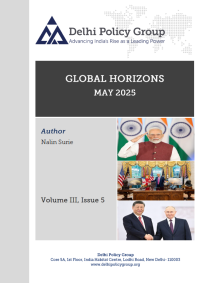Global Horizons
Date: June 05, 2025
This issue opens with a recounting of India’s robust military response (May 07-10) to the reprehensible, Pakistan-supported terrorist attack in Pahalgam on April 22, as well as the new normal announced by the Indian Government that it will henceforth protect its citizens and open democracy from the menace of externally sponsored terror with decisive measures.
Meanwhile, in Europe there was a flurry of activity but continuing lack of clarity in respect of the war in Ukraine, given the ambivalence of the Trump administration, Russia’s military onslaught, Ukraine’s spectacular drone attack deep inside Russian territory, and Europe’s efforts to put together a ‘Coalition of the Willing’ to help Ukraine and also defend itself from Russia. The UK moved closer to the EU in terms of economic ties as well as defence and security partnership.
President Trump’s announcement of a “Golden Dome” missile defence shield for the US mainland on May 20 caused consternation in Moscow and Beijing, with the latter jointly terming the US move “deeply disturbing” as it undermines the “fundamental principles of maintaining global strategic stability”. China and Russia renewed their vows over their “no limits” partnership at a summit held in Moscow on May 8, vowing to “jointly safeguard the international system with the UN at its core”.
With China and Russia deeply perturbed by the likelihood of a new strategic arms race, India will need to be prepared for all possible consequences for its own security.
Security issues in Asia and the Indo-Pacific were at the forefront of discussions at the Shangri-La Dialogue held in Singapore on May 30-31, with US Defence Secretary Hegseth affirming the US intention to increase its focus on the Indo-Pacific as a “priority theatre”, and to deter aggression by Communist China which, he said, seeks to become a hegemonic power in Asia. Delivering a keynote at the same forum, French President Macron spoke of the need for a new special relationship between Europe and the Indo-Pacific. Prospects of heightened US-China rivalry will put pressure on Indo-Pacific nations to preserve their ability to act on their own terms.
President Trump’s first overseas visits of his second term (May 13-16) to Saudi Arabia, UAE and Qatar were investment driven, but also shored up long-term US economic and security interests, while putting a check on Chinese influence. Trump announced the lifting of sanctions on the new regime in Syria.
This issue also covers the deteriorating humanitarian situation in Gaza as well as in Sudan, and efforts to end the conflict in eastern DRC.
In the midst of a volatile international trade environment, India finalised an FTA with the UK on May 6, as efforts continued to negotiate trade agreements with the US and the EU.
The author concludes that the continuation of multiple conflicts poses growing dangers to international order; the need for diplomacy to take centre stage is more manifest than ever.
To read this issue of Global Horizons, Vol. III, Issue 5, please see the PDF attached.
Meanwhile, in Europe there was a flurry of activity but continuing lack of clarity in respect of the war in Ukraine, given the ambivalence of the Trump administration, Russia’s military onslaught, Ukraine’s spectacular drone attack deep inside Russian territory, and Europe’s efforts to put together a ‘Coalition of the Willing’ to help Ukraine and also defend itself from Russia. The UK moved closer to the EU in terms of economic ties as well as defence and security partnership.
President Trump’s announcement of a “Golden Dome” missile defence shield for the US mainland on May 20 caused consternation in Moscow and Beijing, with the latter jointly terming the US move “deeply disturbing” as it undermines the “fundamental principles of maintaining global strategic stability”. China and Russia renewed their vows over their “no limits” partnership at a summit held in Moscow on May 8, vowing to “jointly safeguard the international system with the UN at its core”.
With China and Russia deeply perturbed by the likelihood of a new strategic arms race, India will need to be prepared for all possible consequences for its own security.
Security issues in Asia and the Indo-Pacific were at the forefront of discussions at the Shangri-La Dialogue held in Singapore on May 30-31, with US Defence Secretary Hegseth affirming the US intention to increase its focus on the Indo-Pacific as a “priority theatre”, and to deter aggression by Communist China which, he said, seeks to become a hegemonic power in Asia. Delivering a keynote at the same forum, French President Macron spoke of the need for a new special relationship between Europe and the Indo-Pacific. Prospects of heightened US-China rivalry will put pressure on Indo-Pacific nations to preserve their ability to act on their own terms.
President Trump’s first overseas visits of his second term (May 13-16) to Saudi Arabia, UAE and Qatar were investment driven, but also shored up long-term US economic and security interests, while putting a check on Chinese influence. Trump announced the lifting of sanctions on the new regime in Syria.
This issue also covers the deteriorating humanitarian situation in Gaza as well as in Sudan, and efforts to end the conflict in eastern DRC.
In the midst of a volatile international trade environment, India finalised an FTA with the UK on May 6, as efforts continued to negotiate trade agreements with the US and the EU.
The author concludes that the continuation of multiple conflicts poses growing dangers to international order; the need for diplomacy to take centre stage is more manifest than ever.
To read this issue of Global Horizons, Vol. III, Issue 5, please see the PDF attached.



